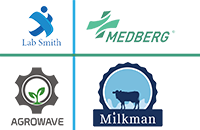Ultrasonic Therapy LCD With Programs
The most important mechanical wave used in physiotherapy is Ultrasound. Ultrasonic Therapy LCD is the utilization of ultrasound energy to treat body tissues. Ultrasound is generated by a transducer head which consists of a crystal mounted at the front that transforms one form of energy into another.
There are twenty-four programs in ultrasonic therapy LCD.These programs are used to treat specific conditions.For example Neuroma ,Lumbago. Post Herpes Pain etc.
There are a number of methods by which ultrasonic therapy LCD is applied. The most common method is to use a “Contact” application, where a thin layer of oil or gel is applied to the skin prior to treatment. The requirement for the Coupling Medium is that it has a similar acoustic impedance to skin.
The crystal vibrates and therefore when in contact with tissue provides a form of micro massage. This enables treatment to be given to a greater depth than is possible manually and also when, at times of acute injuries, pressure cannot be exerted by hand because of tolerable pain to the patient.
When ultrasound enters the body it can exert an effect on the cells and tissues via two physical mechanisms: Thermal and Non-Thermal.
Uses of Ultrasonic Therapy LCD
Following injury, a number of cellular and chemical events occur in soft tissues. The major cellular components of the repair process include platelets, mast cells, polymorphonuclear leucocytes (PMNLs), macrophages, T lymphocytes, fibroblasts and endothelial cells. These cells migrate as a module into the injury site in a well-defined sequence, which is controlled by numerous soluble wound factors.
These wound factors originate from a number of sources such as inflammatory cells, inflammatory cascade systems or from the products of damaged tissue breakdown.
The whole repair process, for convenience, can be divided into three phases as below:
Accessories
| Description |
Value |
| Catalogue No |
JM025 |
| Power Input |
90VA 200V 50Hz AC |
| Ultrasonic Frequency |
1MHz or 1,3 MHz |
| Ultrasonic Output |
Maximum 15 Acoustic |
| Output Mode |
Continuous and Pulsed |
| Pulse Ratio |
Fix: 10, 20, 50, 100Hz |
| Treatment Time |
6-7 minutes |
| Timer |
Digital with Alarm (0-99min) |
| Pulse Setting |
Digital |
| Weight |
3 kg |
| Dimension (H x W x L) |
9 x 33 x 29 cm |

